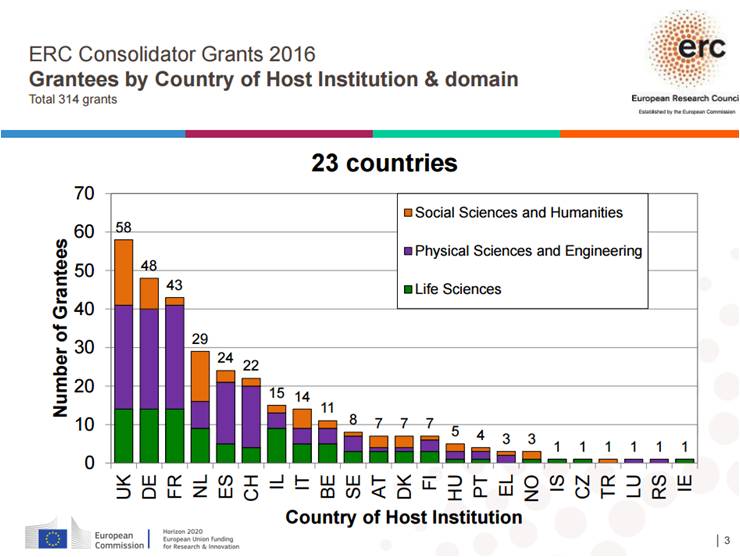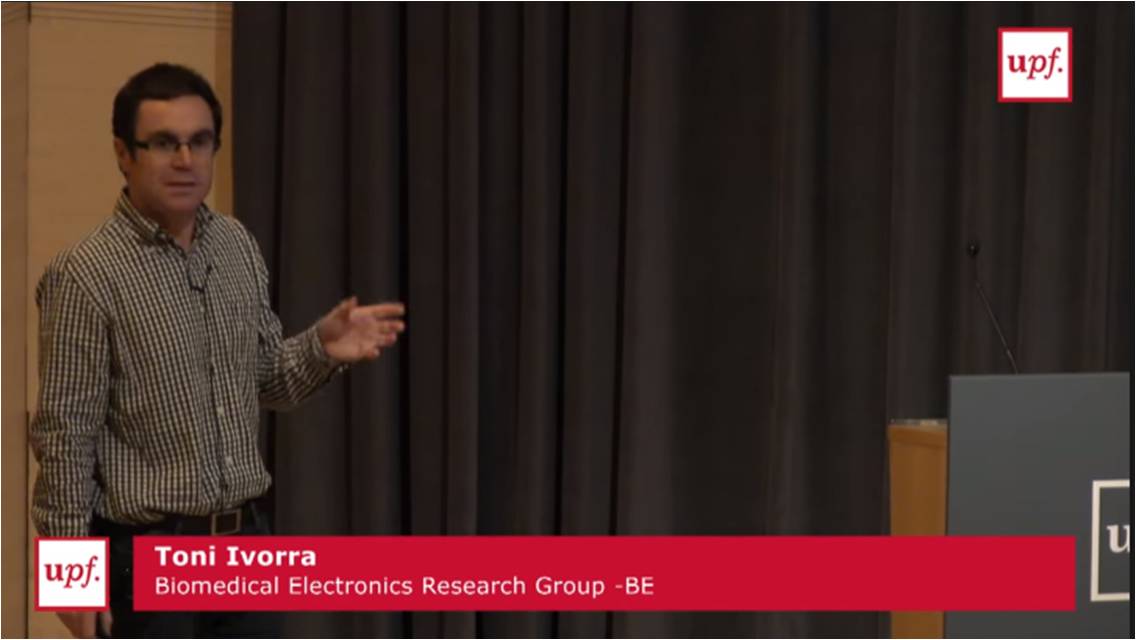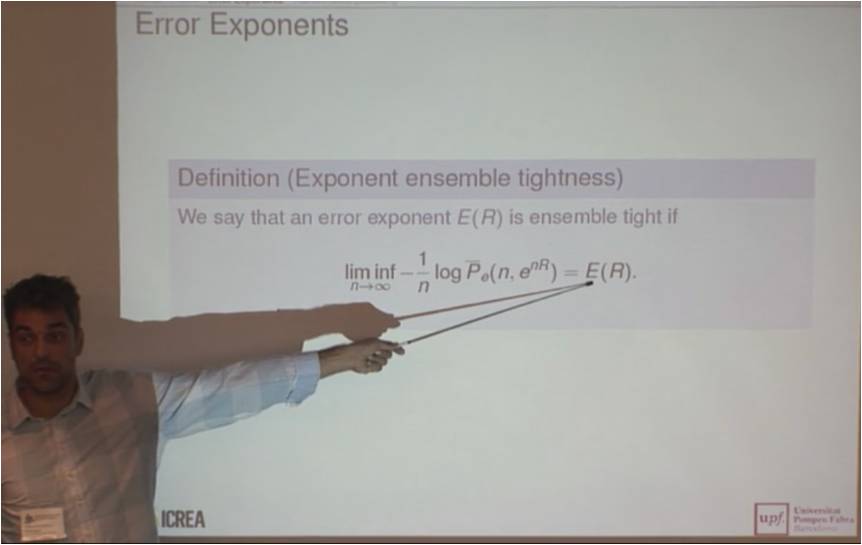The European Research Council consolidates the scientific excellence of four researchers linked to UPF
The European Research Council consolidates the scientific excellence of four researchers linked to UPF
They are Antoni Ivorra and Albert Guillén i Fabregas of the Department of Information and Communication Technologies; Julian Di Giovanni, of the Department of Economics and Business; and Toni Gabaldón, of the Centre for Genomic Regulation, a centre affiliated to UPF and with UPF participation.

On 13 December, the European Research Council (ERC) announced the awarding of its consolidation grants to 314 European researchers. The funding, reaching a total of 605 million euros, will enable their research to have an impact on the world of science and other fields. The grants come under the priority called “scientific excellence” of the EU Horizon 2020 research and innovation programme.
Among the selected researchers are ten who are pursuing their projects at research centres or universities, four of whom are linked to Pompeu Fabra University, and the rest are spread between the Autonomous University of Barcelona, University of Barcelona, and the Institute of Photonic Sciences. All of them are “top level scientists with truly innovative ideas. Investing in their projects will certainly pay off”, said Carlos Moedas, commissioner for Research, Science and Innovation of the European Commission.
Injectable electronic implants
In the project “Electronic AXONs: wireless microstimulators based on electronic rectification of epidermically applied currents” (eAXON), Antoni Ivorra, researcher with the Department of Information and Communication Technologies (DTIC) at UPF, aims to demonstrate injectable electronic implant technology capable of stimulating the muscles and recording their activity. Potentially, this technology will be used to recover motor function in patients who suffer from paralysis. The implants will look like a flexible thread of some three centimetres in length and less than a millimetre thick. These unprecedented features will be possible thanks to the fact that the electrical supply methods used so far in active implants (batteries and inductive coupling) will be avoided, given that they require bulky components. The strategy that will be used is the rectification of bursts of high frequency current flowing innocuously through the tissues and are applied externally through textile electrodes.
 Antoni Ivorra is a Serra Hunter senior lecturer at Pompeu Fabra University’s DTIC. He has a PhD in Electronic Engineering by UPC (2005) and has been a researcher at the Bellaterra National Microelectronics Centre (1998-2005), the CNRS in Villejuif (France), and the University of California in Berkeley (USA, 2005-2008). His research mainly deals with the study of bioelectric phenomena and, in particular, the use that can be made of them to implement new methods and devices for medical practice.
Antoni Ivorra is a Serra Hunter senior lecturer at Pompeu Fabra University’s DTIC. He has a PhD in Electronic Engineering by UPC (2005) and has been a researcher at the Bellaterra National Microelectronics Centre (1998-2005), the CNRS in Villejuif (France), and the University of California in Berkeley (USA, 2005-2008). His research mainly deals with the study of bioelectric phenomena and, in particular, the use that can be made of them to implement new methods and devices for medical practice.
Theoretical study of information processing
Claude E. Shannon’s (1916-2001) Information Theory paved the way for the age of information, providing the mathematical fundamentals of digital information systems. One of the main assumptions of Shannon’s results is the knowledge of the probability distribution that governs the system. In real systems, this knowledge is often not possible. The project by Albert Guillen i Fàbregas, ”Information Theory with Uncertain Laws”, will develop theoretical studies of information processing that take into account uncertainty in the probability distribution that governs the system, as well as coding systems that reach the established limits of theoretical study.
 Albert Guillen i Fàbregas is an ICREA research professor at UPF’s DTIC, as well as a researcher affiliated to the University of Cambridge (United Kingdom). He graduated in Telecommunications Engineering and in Electronic Engineering by the Polytechnic University of Catalonia and the Politenico di Torino (Italy), respectively. He then earned a doctoral degree at École Polytechnique Fédérale de Lausanne (Switzerland) in 2004. He was one of the main members of the organizing committee of the 2016 IEEE International Symposium on Information Theory which was held at UPF in July 2016, and is a member of several editorial boards of international journals and publications.
Albert Guillen i Fàbregas is an ICREA research professor at UPF’s DTIC, as well as a researcher affiliated to the University of Cambridge (United Kingdom). He graduated in Telecommunications Engineering and in Electronic Engineering by the Polytechnic University of Catalonia and the Politenico di Torino (Italy), respectively. He then earned a doctoral degree at École Polytechnique Fédérale de Lausanne (Switzerland) in 2004. He was one of the main members of the organizing committee of the 2016 IEEE International Symposium on Information Theory which was held at UPF in July 2016, and is a member of several editorial boards of international journals and publications.
Economic interdependence in a globalized world
Researchers and policymakers alike have highlighted the potential gains in efficiency that a global production structure could entail. However, these links also involve potential risks. The project by Julian Di Giovanni, “Global Production Networks and Macroeconomic Interdependence” (GLOBALMACRO), addresses two challenges, theoretical and empirical, in the incorporation of the microeconomic structure of international production and trade networks in the study of the propagation of shocks at the international level and their impact on macroeconomic interdependence. The project provides a quantitative analysis of the importance of links, both at the level of a company and of the global economy, and proposes the use of new data sets, on a microeconomic level.
 Julian Di Giovanni obtained his PhD in Economics from the University of California in Berkeley (USA) in 2004. He is currently a professor with the Department of Economics and Business at UPF and occupies the post of deputy director for research and research professor at the Barcelona GSE and is an associate researcher at the Centre for Research for International Economics (CREI). In addition, he is a researcher of the Centre for Economic Policy Research in London (United Kingdom).
Julian Di Giovanni obtained his PhD in Economics from the University of California in Berkeley (USA) in 2004. He is currently a professor with the Department of Economics and Business at UPF and occupies the post of deputy director for research and research professor at the Barcelona GSE and is an associate researcher at the Centre for Research for International Economics (CREI). In addition, he is a researcher of the Centre for Economic Policy Research in London (United Kingdom).
With regard to the concessions for the consolidation of the research of excellence achieved by members linked to UPF, in the field of Life Sciences is “Reticulate evolution: patterns and impacts of non-vertical inheritance in eukaryotic genomes” by Toni Gabaldón, ICREA researcher at the Centre for Genomic Regulation, a centre affiliated to UPF and with UPF participation.
This year, the CER has evaluated 2,274 research proposals of which it has selected 13.8%. 28% of the grants have been awarded to women. The grants will create some 2,000 jobs for PhD students, post-doctoral students and administrative staff working in the research teams.
The European Research Council, created by the European Union in 2007, is the main body funding cutting edge research. The CER’s consolidation grants are awarded to researchers of any age and nationality with a minimum of 7 and a maximum of 12 years of experience, once they have completed their doctorate and with a brilliant scientific background. The research must be carried out in a public or private research centre established in one of the EU Member States or associated countries. The grant of a maximum of 2 million euros is awarded for a maximum of five years and serves mainly to cover the costs of the researchers’ workplace and the personnel on their teams.
Information source: press release issued by delegation of the European Commission in Barcelona.
